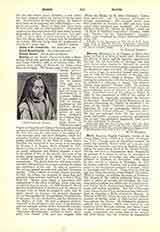

Blyth, FRANCIS, English Carmelite, reviser of the Douay Bible, born c. 1705; d. in London, December 11, 1772. Though born of Protestant parents, he joined the Catholic Church while yet a youth, and entered the Carmelite novitiate at Modena in 1723, taking the name Simon Stock of the Blessed Trinity. Having obtained a dispensation from irregularity on account of a defect in vision, he proceeded to Malta for a course of studies, and after ordination returned to England, in November, 1730, where he first served a mission in Wiltshire. In 1741 he became assistant chaplain, and in 1756 chaplain-major to the Portuguese embassy in London, where he remained until his death. From 1742 till 1755, he also was Vicar Provincial of the English Carmelites. While in London, he assumed the name of Courtney. The chapels of the various embassies being recognized as places of worship for Catholics, the chaplains held a position not unlike that of parish priests, and Father Blyth distinguished himself by his eloquent and zealous preaching. The first ambassador under whom Father Blyth served was Dom Sebastiano-Jose de Carvalho e Mello, afterwards Marquez de Pombal (1739-45), whom he was, at a later period, accused of having aided in high-handed proceedings against the Jesuits. He indignantly protested against the calumny. Blyth was buried in the cemetery of St. Pancras, London, and, being a man of great literary attainments and author of many works, a memorial was raised there in his honor. His chief labor was the revision, in conjunction with Bishop Challoner, of the so-called Douay Bible; while adhering closely to the text of the Vulgate, the revisers sacrificed the energetic language of the older translators for a much weaker one which frequently lacks dignity. His other works comprise expositions of the Penitential Psalms and other portions of Holy Scripture, sermons, and controversial writings.
B. ZIMMERMAN

